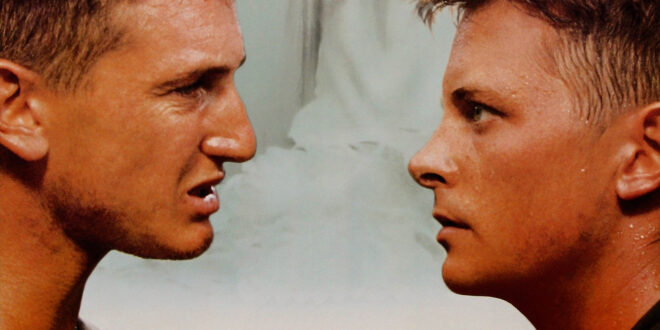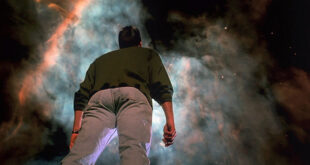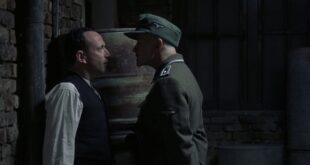To put it simply, Brian De Palma’s Casualties of War is a devastatingly sad anti-war drama. Based on actual events of the 1966 incident on Hill 192 during the Vietnam War, a Vietnamese woman was kidnapped from her village by a squad of American soldiers who raped and murdered her. It’s essentially about morality and how there is an innate sense of right and wrong in a dire situation like war, or is it all about survival? It’s about following orders or going along with the crowd vs. standing up for some injustice you’ve seen, no matter the cost. It’s also about the brutality of violence, the trauma of war, the brutality of masculinity, and the brutality of misogyny. These are not pleasant subject matters to deal with on screen. Not a film where you gather the family for a night of escapism at the movies. You’ll likely never forget Casualties of War after seeing it, and it’s all the greater because of it.
By 1989, Vietnam pictures had become a staple in American cinema. Films like The Deer Hunter, Apocalypse Now, Platoon, and Full Metal Jacket came out with tremendous success and fanfare. Oliver Stone’s Born on the Fourth of July was released later that year with immense success. They told the horrors of the Vietnam War at a time when Americans were beginning to reexamine that terrible criminal nightmare. By the time Casualties of War came out, it had received some excellent reviews but did not do well at the box office. Critics like Siskel and Ebert liked the film but did not give it as high of marks as they did Platoon. The timing of the release clouded the critical reaction at the time. It also was out during the infamous Summer of 1989 with films like Uncle Buck, Batman, Parenthood, The Abyss, When Harry Met Sally, Lethal Weapon 2, and Turner & Hooch were going strong. For a film with a genuinely tricky subject matter like the one it portrays to compete with these more mass entertainment films was asking a lot. For De Palma, this came after the tremendous success of The Untouchables. Casualties of War, and The Bonfire of the Vanities, would lead to a career setback for him.
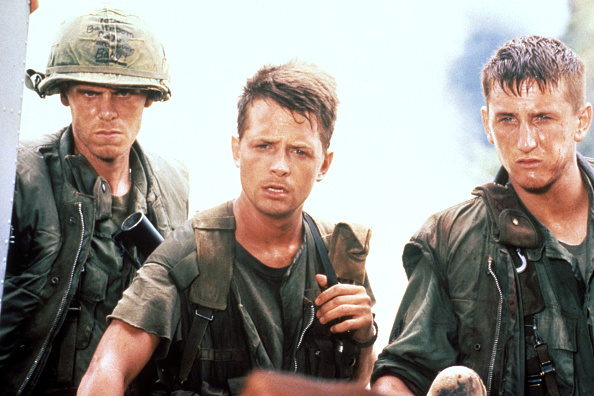
Like most De Palma films, though, Casualties of War has undergone critical reexamination and praise. However, it’s still not considered as significant as more infamous Vietnam films like the ones mentioned above. I’m here to argue that it is just as monumental and maybe one of the most powerful anti-war films ever made. I almost hesitate to call it a war film because while there are few battles and action scenes, it’s more about the moral problem faced by our main character and the horror unleashed on an innocent Vietnamese woman. De Palma films in his usual theatrical style which I love a lot. Big set pieces, dramatic music, and appalling beauty. He usually boiled down his films to three or four big visual set pieces. You’ll never come out of a De Palma film not interested in visual storytelling. That’s who De Palma is at heart, is a visual cinematic storyteller. He’s one of my all-time favorite filmmakers, and my love of visual storytelling comes from films like his and Hitchcock.
Casualties of War begins sometime in the future of the main action with our hero Max Eriksson played by Michael J. Fox, sitting on a streetcar, fading in and out of sleep. Something is bothering him. He looked worn out and strung out. What sets the story in motion is Eriksson looking at someone on the streetcar who reminds him of the raped woman later in the story. Through that, we are sent on a flashback to his experience in Vietnam. Eriksson is part of a squad led by Seargent Tony Meserve (Sean Penn). On a nighttime patrol, they are attacked by VC Eriksson falls through a VC tunnel, narrowly escaping being killed by Meserve pulling him out. This is a crucial opening because Meserve will later become the story’s main antagonist and confront Eriksson head-to-head.
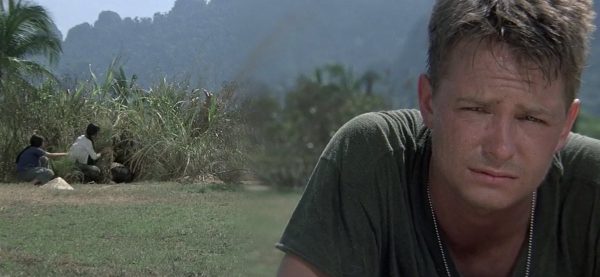
On break and in a Vietnamese village, one of Meserve’s friends and a squad member Brownie is killed in an ambush. After being issued a short leave, a frustrated Meserve and members of the squad, especially Clark, are keen on kidnapping and raping a pretty Vietnamese girl from that same village as revenge. At first, Eriksson doesn’t think he’s serious. Still, Meserve goes through with the plan, much to Eriksson’s horror, and begins to resist the idea of what they’re doing. In a powerful sequence, we see from Eriksson’s point of view in the distance as Meserve and three other members of the squad rape and have their way with her. Including newcomer Diaz who at first expressed the same doubt as Eriksson.
Eriksson is powerless in this situation, not to mention the girl Tran who has been abducted. It’s a horrible feeling watching these events unfold because, like Eriksson, we, too, are helpless to help. There’s a certain guilt that comes with that. At one point later, after the rape, Eriksson makes almost a half-hearted attempt to rescue Tran during daylight after he is told to guard her as the rest of the squad looks to attack a VC supply depot but is caught by Clark. Here comes the most harrowing sequence of the picture, Tran’s death scene. Meserve wants Eriksson to waste Tran because her persistent coughing and trauma could give away their position. Eriksson refuses, Hatcher refuses, and Diaz is about to until Eriksson fires in the air alerting the enemy of their work, and an ensuing firefight occurs. Clark then stabs Tran, but she makes one last break for it across the train tracks on the ridge. It’s here that Ennio Morricone’s score kicks in as everyone in the squad besides Eriksson, who fails again to save Tran, fires at her killing her. It’s a masterfully harrowing sequence in which De Palma pulls out all his best assets as a filmmaker, particularly tension. The rest of the film then follows Eriksson as he refuses to stay silent about what happened, eventually after much tribulation from Army brass, leading to the arrest and conviction of Meserve, Clark, Hatcher, and Diaz.
The acting in the film is top-notch, and the cast is full of great character actors of the time, like John Leguizamo, John C. Reilly, Don Patrick Harvey, Ving Rhames, and Dale Dye. In particular, Don Patrick Harvey is very evil as Clark and has a very unsettling quality about him. John C. Reilly was impressed in a very early role as the more dumb-witted Hatcher, willing to go along with any sarge plan. The two central performances are Michael J. Fox as Eriksson, and he brings the necessary righteousness and commitment to truth for the role. It was a performance outside the normal for Fox, and while some might complain his character is a little too morally righteous, a big thing that drives Eriksson is guilt. The guilt of not doing enough. The shame of feeling powerless. The highlight performance of the film is, by far, Sean Penn as Meserve. He has this crazy look in his eye and can be calm one minute but fuck you over the next. It’s an insanely watchable performance that should have garnered an Oscar nomination. Another remarkable performance comes from Thuy Thu Le as Tran in part, requiring her to portray agony and fear constantly. She does so with fierceness and honesty, and watching what happens to her is genuinely harrowing.
Casualties of War, like many great anti-war films, is about how war dehumanizes us. We get the sense, other than Eriksson, who is newer to the Nam than the rest of the squad, that the entire experience has left them unable to think of the Vietnamese as human beings. Eriksson is made fun of by the rest of the squad for trying to make friends with Vietnamese children in the village. His manhood is challenged when he won’t participate in the rape of Tran. These American boys turned into monsters because our government decided to send troops there. It doesn’t excuse any misdeeds in the film, but it’s about how moments like that are born from significant traumatic events. The powerlessness of being unable to correct or stop injustice is prevalent today. There’s a haunting nightmare quality that keeps drawing me back to Casualties of War and De Palma.

 Movie Finatics The Place for Movie Lovers
Movie Finatics The Place for Movie Lovers
